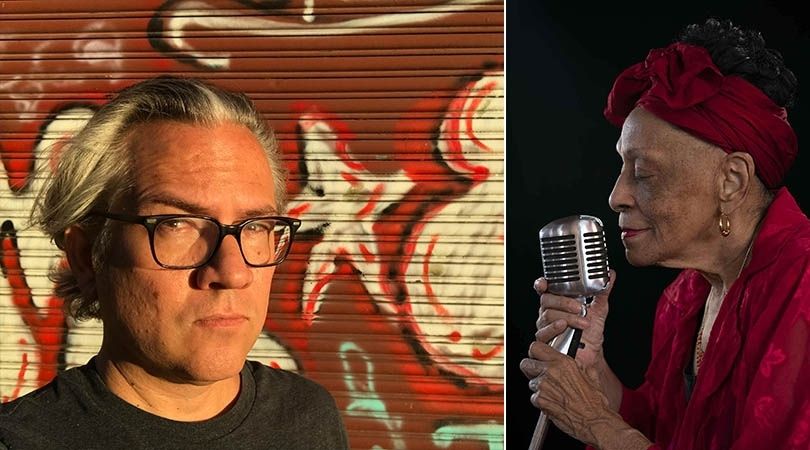
Back in the ‘40s, a musical movement appeared in La Habana. It had troubadour roots and jazz influence; instead of relying on technique, it focused on emotion and freedom. It is poetry transformed into music and, at 91 years old, legendary singer Omara Portuondo is still waving its flag. The name of this movement (some call it a genre) is ‘filin’ or ‘feeling’ which is exactly what Hugo Pérez conveys with Omara, a moving documentary exploration of La Novia del Filin that will have its World Premiere at DOC NYC 2021.
“The way she communicates with people and expresses whatever she has inside of her, is through her songs,” said Pérez during my interview with him about his iconic subject who we follow throughout the film as she passionately performs in Cuba, Japan, México, and the United States. The age is no problem; despite having a seven-decade-long career, the former Buena Vista Social Club displays remarkable energy, contagious joy, and an inspiring mindset. The documentary is both a homage to this Cuban icon and an uplifting source of motivation.
On its surface, Omara looks like a straightforward biographical documentary, but after you listen to Omara’s singing you’ll realize the brilliance behind Pérez’s directing: instead of using an abundance of talking heads, he lets her music guide you into her soul. Not just live performances, but impromptu singing in the street while visiting his old home or in the middle of a press interview.
Ahead of the premiere of Omara at DOC NYC 2021, I spoke with Hugo Pérez about his approach to directing Omara, the musical storytelling, her importance in Afro Latinx identity, the state of nonfiction filmmaking, and more.
BUT WHY THO: How was the Omara project born?
Hugo: My family is from Cuba. I was born in New York, but in 1996 I started going back and forth working on different projects. I first met Omara about 10 years ago. There was a concert special that friends of mine were organizing. We had all the permissions in Cuba, but when we got back to the States, we were told that even though it wasn’t a political show, because it was Cuba it was too political to do, so the whole thing didn’t happen. But as a result, I met Omara and her son Ariel Portuondo. Flash forward eight years and I was producing for somebody else a documentary about Cuban baseball and the Negro Leagues, and it turns out that Omara’s dad, Bartolo, was one of the great baseball players not just in Cuba, but in the Negro Leagues in the 1920s. We did an interview with Omara about it, but she had to fly to Poland for a tour. Her son Ariel and I stayed behind, we had an espresso in her kitchen and over that, he told me: ‘Would you be interested in making a film about my mother? If you are interested, I can give you the rights to make the film.’
It doesn’t normally happen when you suddenly have the rights to do a film about an iconic figure. You usually have to chase them for many years. In this case, Ariel and I had a good friendship, and he felt that he could trust me. So I thought that this would be a really interesting opportunity to create a portrait of an artist in the third act of their life. It feels like Omara has a different quality when she sings now than when she was younger. To me, it’s even more powerful and heartrending, so I thought it could be really great. Imagine if you could make a documentary about Ella Fitzgerald, Édith Piaf, or any of the great singers at the end of their lives. And here I have this opportunity to make a film about Omara. I had to do it.
BUT WHY THO: Throughout the documentary, it’s clear that Omara has all these protective barriers around her. She refuses to reveal stuff about her past and personal history. How did you structure this documentary realizing this?
Hugo: There’s a lot of things that she didn’t want to talk about and I knew that going into the film, and that’s a challenge. How do you make a film about someone who doesn’t want to reveal things? I felt that the way she communicates with people and expresses whatever she has inside of her is through her songs. So I started thinking about the film almost like a musical. We take you through the details of her life, but instead of Omara telling you how things went and how she felt, we cut to certain songs and moments emblematic of her life. For instance, there’s a scene where she goes back to her neighborhood, talks about her mother and upbringing, and sings Amigas.
Today, when you watch these kinds of biopics, every little detail is given to you. Everybody is examining and slicing. Here, we have a woman with some mystery around her life. Do you want to know her? Well, listen to her sing. It’s not going to tell you the details, but it’s going to take you into her soul and her heart, and you are going to know how she feels. You might not know the details, but you are going to know what her feelings are.
BUT WHY THO: How did you decide to shoot the last scene with Omara looking over an empty stage?
Hugo: One night, she had just played a show in New York to a full house, there was a dinner upstairs, but Omara couldn’t go up and down the stairs. So while everyone went up at the end of the night, I kept her company on the stage. The theater was dark. It was just me and her, and she said: “You can’t imagine how many nights I’ve had like this.” And then I had this epiphany: she could be performing for 1,000 people or 15,000 thousand people, but at the end of the night, the audience leaves, her family goes to bed, and it’s just her and her memories. So I wanted to end the film with something poignant and beautiful: to depict how, even if it’s just her, she can fill this empty space with her music. It felt right to me. And right before the scene, you hear her voice saying: “Life gives you roses and gives you thorns”. And I feel that, when we cut to her, singing by herself in an empty theater, we get that sense of duality of existence. The beauty and the solitude.
BUT WHY THO: Omara is a very important documentary for Afro Latinx representation. How do you perceive this aspect of the American industry? Is it going forward?
Hugo: It seems like African American representation has improved a little bit in recent years. If you look at the big Marvel movies or Netflix, you can see that. But when you look at the Afro Latino experience, that still seems like an invisible demographic. There are several Afro Latino actresses that have done well, but they are usually cast as African American.
I think it’s a great time to explore Afro Latino identity and Omara is certainly one of the iconic figures in Latin American. The last couple of years have been a little frustrating for me because we had a rough cut before COVID-19. We’ve gone to a lot of the big companies, and while people appreciate the film and Omara, there’s still this… they are not diving into it. The message I’m indirectly getting is that ‘there isn’t a big enough market for it.’ And I feel like it’s the opposite. When I see Omara in concert, and I see the way people respond to her, and the way Afro Latinos respond to her… look at the Tokyo section of the film.
Omara is performing in Tokyo and you see all these young Japanese women crying at what she’s singing. She’s Afro Latina, but she’s a universal figure that connects with everybody. However, people still pigeonhole her. They say that the demographic is not that big or that she’s only going to appeal to older audiences. It’s funny because most of the people that are most excited about Omara that I’ve talked to are younger people. People in their twenties or thirties. She helps them connect to a sense of identity. She represents a direct line to a certain cultural identity that is increasingly getting lost. I think younger people, especially Afro Latino people, are looking to connect with a certain identity. They look at Omara, and they say: I connect with her.
BUT WHY THO: What do you feel is the state of nonfiction filmmaking right now? Is there more support from distributors? Is there more interest from audiences?
Hugo: I think there’s a huge amount of interest from audiences for documentaries. Nowadays, I see that many of my non-filmmaking friends are watching documentaries. They talk about great documentaries they saw on HBO or Netflix. And 10 years ago they would’ve never used the word documentary at all. There’s a greater audience and hunger than ever.
We live in a documentary renaissance right now. There are so many interesting filmmakers making so many interesting films, telling stories in very creative ways. It’s amazing. But, a lot of the most creative voices are not necessarily finding wide audiences. However, at the same time that we have huge demand and a wellspring of amazing creativity, there’s a cookie-cutter approach to creating high-end documentaries, particularly in the true-crime realm. There’s a certain sameness, a formula. There’s a lot of money going into it. But on the other hand, streamers are commissioning some really interesting work, like “A Cop Movie.” They are interested in documentaries that are doing creative things with the form.
BUT WHY THO: You co-directed another documentary screening at DOC NYC: Once Upon a Time in Uganda. What can you tell me about it?
Hugo: I co-directed it with Cathryne Czubek. The idea started back in 2014. My friend Alan Hofmanis, who’s a subject in the film, went to Uganda to find these guys that were making action movies in the slums. He came back from that first trip and told me: “Hugo, I’m an action star in Uganda now.” I immediately thought it would be a great documentary.
Isaac, Alan, and Wakaliwood. It’s one of the most fun groups of people that I’ve ever hung out with in my life. From the minute that we landed, they took us in and it was really amazing and fun to be there, seeing them create magic with nothing. Here, in the “first world,” everybody says that they don’t have the money. There are lots of excuses for not making films, and over there, they say: “Well, we’re just going to make the film. We have no money, but we have ourselves, we have this camera, let’s go out there and shoot.” And it’s very exciting to be part of that.
Once Upon a Time in Uganda and Omara are very different films aesthetically and in terms of the subject matter, but one thing the two have in common is that you find a lot of joy in the things the subjects do, Omara with her music and Isaac Nabwana with the films that they make in Wakaliwood.
Omara will screen in-person on Saturday, November 13 at IFC Center and Monday, November 15 at Cinépolis Chelsea. It will also be available online from November 14 to 28. You can find more details and purchase tickets on the official website of DOC NYC. You can learn more about Once Upon a Time in Uganda at this link.






